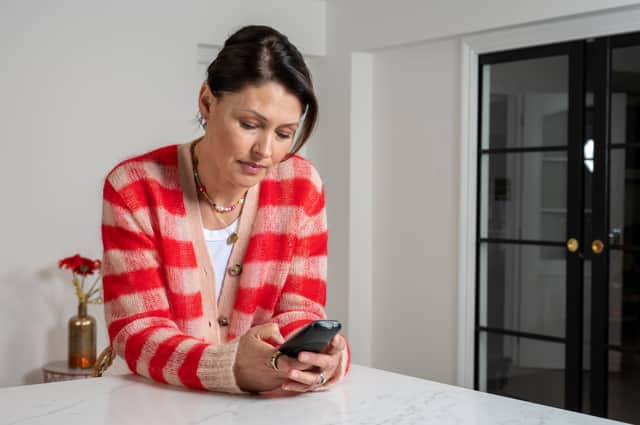The average person completes 90 online tasks a day


A poll of 2,000 adults revealed they typically use the internet nine times a day to check social media, five times to book appointments and six times to stream content such as videos and music.
As a result, 54 per cent reckon they would struggle to make it through the day without connectivity.
Advertisement
Hide AdAdvertisement
Hide AdBut 61 per cent have experienced this before due to lack of data, battery or signal - leaving those affected feeling stressed (41 per cent), isolated (31 per cent) and anxious (29 per cent).
The research was commissioned by Vodafone as part of its ‘everyone.connected’ campaign which aims to close the digital divide by donating connectivity, skills and devices to people and businesses across the UK living in digital exclusion.
To support the campaign, the telecommunications company has teamed up with TV presenter, Emma Willis, to create a new YouTube mini docu-series, ‘Disconnected’, to show the realities of those who are affected and raise awareness.
In the first episode which has launched today, Emma highlights some of the simple daily tasks that are quick to perform when online, but become time-consuming challenges without any connection to the internet, apps or social media.
Advertisement
Hide AdAdvertisement
Hide AdEmma said: “We wanted to get under the skin of the issue and better understand, in just a small way, what life is like for those who are digitally excluded.
"What really surprised me is the time it takes to complete basic daily tasks, something many of us take for granted, like booking a doctor’s appointment or navigating to a destination, because so much is now digital-first.
"We’ve barely scratched the surface of the digital divide in this docu-series, but we’ve seen and heard first hand from people how important connection is to everyday life, and why it’s imperative to close the gap between those with and without connectivity, skills or devices.”
The study also found staying connected helps 57 per cent with their financial management, while 54 per cent feel it gives them the ability to successfully complete their daily tasks.
Advertisement
Hide AdAdvertisement
Hide AdAlmost four in 10 (39 per cent) use their phone to communicate with friends and family up to three times a day, and 34 per cent cite this as their biggest struggle if they were to find themselves without internet connection.
Other predicted struggles include shopping (34 per cent), managing finances (31 per cent) and maintaining work expectations (21 per cent).
It emerged 38 per cent of those polled via OnePoll believe connectivity is more important than exercising (29 per cent) or socialising (29 per cent).
And 49 per cent claim they would have higher stress levels if data wasn’t accessible.
Advertisement
Hide AdAdvertisement
Hide AdNicki Lyons, chief corporate affairs and sustainability office at Vodafone UK, said: “We believe everyone should benefit from digital connectivity and tackling digital exclusion sits at the heart of our business.
"As our docu-series with Emma shows, connectivity is critical to so many parts of our lives – from staying connected to friends and family, to securing new education or job opportunities.
"But digital exclusion is often an invisible issue which is why we’re raising awareness of the realities of disconnection.
“I’m proud of what our initiative has already achieved and the continuing work we are doing in this space to ensure no one gets left behind as society becomes increasingly digital-first.”
Advertisement
Hide AdAdvertisement
Hide AdIn episodes two and three, Emma meets some of those affected by the digital divide, as well as some of the charities working with Vodafone to help improve digital exclusion, including Good Things Foundation, the Trussell Trust, Independent Age and LandAid.
Comment Guidelines
National World encourages reader discussion on our stories. User feedback, insights and back-and-forth exchanges add a rich layer of context to reporting. Please review our Community Guidelines before commenting.